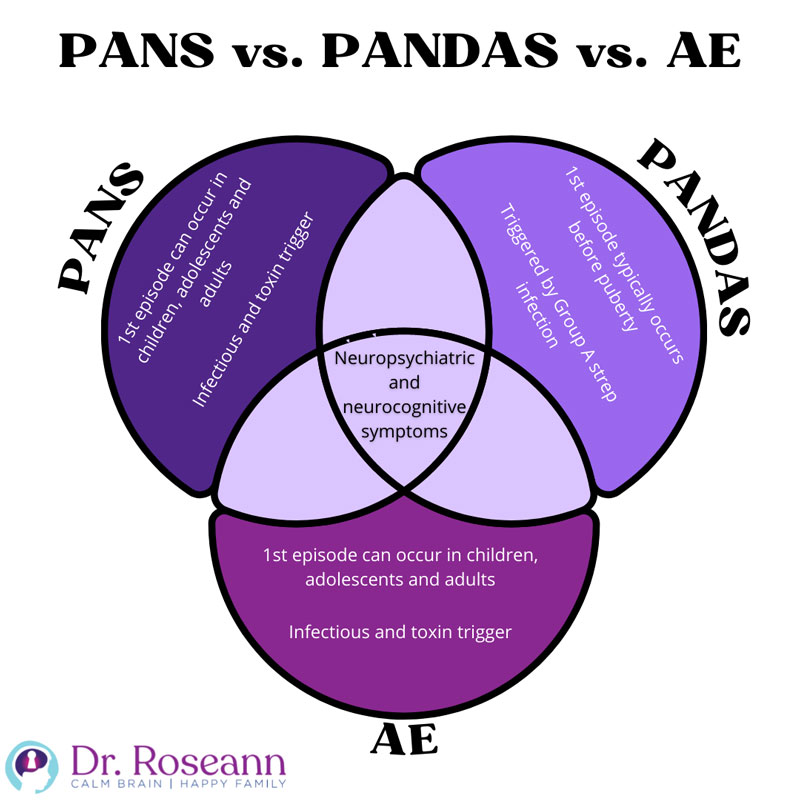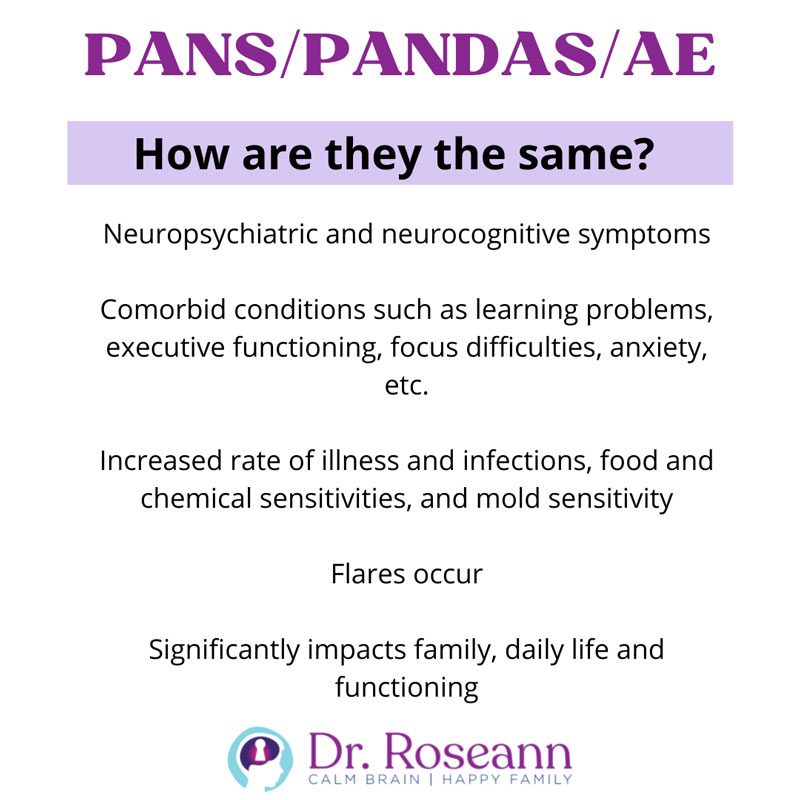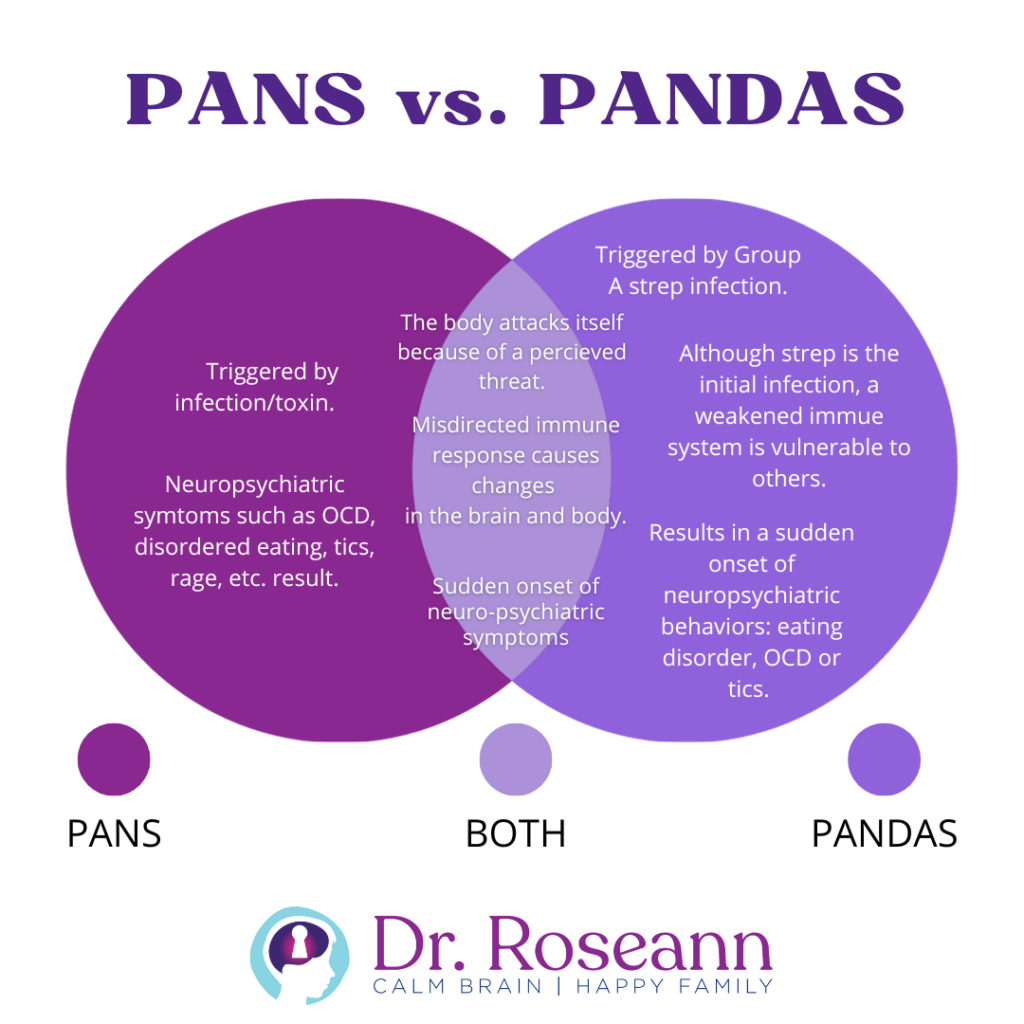What are PANDAS, PANS, and Autoimmune Encepathology? Are PANS and PANDAS the same thing? That is a question I hear just about every day. Understanding PANS, PANDAS, and Autoimmune Encepathology can confuse parents and practitioners. Even though the diagnostic guidelines are clear, these conditions present similarly.
It is important to recognize that these pediatric autoimmune neuropsychiatric disorders are distinct conditions that result from different infectious sources but produce similar neurocognitive and neuropsychiatric symptoms, including immune system involvement.
PANS is a clinical diagnosis given to children with a dramatic onset of a neuropsychiatric symptom or a sudden worsening of a pre-existing mental health condition. The same is true with PANDAS, although this one is associated with streptococcal infections. The onset of neuropsychiatric symptoms can appear overnight, or various “soft signs” may wax and wane before dramatic onset or sudden acceleration of a clinical issue or condition.
“Soft signs” that may appear before the initial onset of a PANS/PANDAS episode may include a high frequency of illnesses, attention problems, irritability, sleep problems, bowel and bladder issues, etc.
The sudden onset of symptoms in children with these clinical disorders can include obsessions and compulsions, food restrictions, and tics. The sudden and dramatic onset of symptoms separates PANDAS and PANS from these other disorders because a clinical diagnosis of obsessive-compulsive disorder OCD, an eating disorder, or a tic disorder isn’t part of the clinical features.
With Autoimmune Encepathology (AE), the same behaviors and issues are present, but there isn’t a dramatic onset of symptoms. When we look at their clinical history, there isn’t a single onset episode but rather a variety of behaviors and illnesses that led to one of the clinical disorders.
Paul’s Story
Paul was a teenager struggling with ADHD, executive functioning issues, and anxiety over his two siblings diagnosed with PANS, Lyme Disease, and tick-borne illness. His one brother was so behaviorally dysregulated that his needs dominated the family. His brother's rages that led him to go in and out of the hospital had Paul and his family on edge. Paul’s mom, Jane, said, “We were a hot mess.”
Once Paul’s siblings got treatment for their infection, calmed their brain with neurofeedback, and the whole family did therapy to address the trauma of their years-long hell, it became apparent that Paul was stuck too. He was depressed, totally unmotivated, and just lying in his bed for days at a time. Despite trying a lot of interventions, Paul wasn’t shifting like the rest of his family.
The question was whether Paul was depressed from all he had endured after being the “functional” one in the family or if he had PANS, PANDAS, or AE.
Jane wanted Paul to come in after her boys' success with a QEEG brain map and neurofeedback. Given that the QEEG brain map is an unbelievable diagnostic tool, I could see that Paul showed signs of inflammation and infection in his brain with clear patterning of depression and anxiety.
Despite a diagnosis of ADHD, he didn’t have ADHD or even meet the clinical criteria, as the onset of symptoms didn’t appear until he was a teen. His attention and executive functioning were impaired not because of clinical ADHD but because of inflammation in his brain, anxiety, and depression.
When we made a thorough clinical history, we found that Paul was treated for Bartonella and Lyme, and at that time, he had a sudden onset of ADHD symptoms, sensory issues, and restricted eating. His behavior was so mild compared to his siblings that they didn’t see him as having PANS and all, the focus issues disappeared with antibiotics.
We got Paul to a naturopathic physician to run lab work, address his infections, and replace nutrients, and he began our BrainBehaviorReset™ Program to calm his brain and get more alert. We focused on science-backed natural remedies for his nervous system to get regulated so he could think, pay attention, and take action.
It is hard to describe how special Paul is and how much he found his stride when we calmed his brain, helped his body detoxify, and changed his diet. He said, “I didn’t know I could ever feel so happy.”
What is Pediatric Autoimmune Neuropsychiatric Disorder Associated with Streptococcal Infections (PANDAS)?
Pediatric Autoimmune Neuropsychiatric Disorders Associated with Streptococcal Infections or PANDAS is a clinical disorder triggered by Group A strep bacteria or infections that result in a sudden onset of neuropsychiatric behaviors and either obsessive-compulsive disorder (OCD) or tics.
Children with PANDAS often have a history of scarlet fever, strep throat, or a positive blood strep test, as streptococcal infections might not appear in a throat culture but can appear in the blood and organs.
Although strep may be the initial infection, a weakened immune system often opens the door to other infections, food and chemical sensitivities, and mold sensitivity. Only PANDAS has been identified as a subset of PANS. You can also get more information about this condition from the PANDAS Physicians Network.
What is Pediatric Acute Onset Neuropsychiatric Syndrome (PANS)?
Pediatric Acute-Onset Neuropsychiatric Syndrome is a clinical disorder that results in the sudden onset of OCD symptoms such as intrusive thoughts, compulsive behaviors or ritualistic behaviors, or disordered eating after an infection, multiple infections, or toxic triggers to the immune system that results in inflammation.
What is Autoimmune Encepathology?
Autoimmune Encepathology (AE) is a type of brain inflammation that results when the body's immune system attacks its healthy cells and tissues in the brain or nervous system, which causes changes in both physical and mental health.
Neuropsychiatric and neurocognitive symptoms vary from person to person but significantly impact their life in some way at school, home, work, or in relationships.
Neurological Symptoms
-
- Cognitive difficulties: memory loss, retrieval difficulties, and slowed processing
- Abnormal movements
- Numbness
- Involuntary facial movements (facial dyskinesia)
- Problems with balance or coordination (or ataxia)
- Communication and speech difficulties
- Changes in vision
- Loss of consciousness or coma
- Seizures
Psychiatric symptoms
-
- Anxiety
- Panic attacks
- Compulsive behaviors
- Loss of inhibition
- Agitation, fear
- Aggressive behavior
- Hallucinations, delusions, paranoia, or psychosis
- Sleep problems or insomnia
- Altered sexual behaviors
Ruling out tumors, seizures, PANS/PANDAS, and other physical and mental health issues are important in diagnosing AE. Testing often involves nuclear imaging, such as an MRI, blood work, and a spinal tap.

How are PANDAS and PANS the same?
Children with PANS and PANDAS share many of the same symptoms. The main way PANS and PANDAS are the same, even though they are two different disorders, is that they have a sudden onset of neuropsychiatric and neurocognitive symptoms.
The three clinical conditions have overlapping symptoms and comorbid conditions. Studies show that patients and their families also have a high rate of medical issues and illnesses, including frequent and chronic infections, allergies, frequent sore throats, ear infections, headaches, chemical sensitivity, urinary frequency, and many other issues (Calaprice et al., 2017).
According to the same research studies, common developmental diagnoses of those with acute-onset neuropsychiatric syndrome include:
-
- ADHD
- Sensory Integration Disorder
- ADHD
- Learning disability
- Speech delay
- Handwriting disorder (dysgraphia)
- Math disorder
- Reading disorder
- Visual perception disorder
- Coordination disorder
All three clinical issues significantly impact daily functioning at school, work, home, family, relationships, or some aspect of their life.
Flares, or an uptick in symptoms, often occur in all three, triggered by illness, infection, toxins, stress, fatigue, and diet.

How are PANS and PANDAS Different?
The main way PANS and PANS differ is the source of neuropsychiatric and neurocognitive symptoms. PANDAS initial onset results from a Group A strep infection, and PANS can result from an infectious or toxic trigger.
The two are different in age of onset, as PANDAS has a typical onset before puberty, and a PANS onset can occur at any age, even as an adult.
While PANS and PANDAS have a sudden onset of neuropsychiatric or neurocognitive issues (or a deep acceleration of a pre-existing clinical condition such as anxiety, OCD, ADHD, etc.), Autoimmune Encepathology is different from PANS and PANDAS because there is no requirement of sudden onset and the range of onset symptoms is broader. With AE, one can have a sudden or gradual onset of symptoms.

Is the treatment for PANS and PANDAS the same?
At my center, the basic treatment protocol for PANS and PANDAS patients is the same, as no healing can occur if you aren’t calming the brain and addressing improper detoxification. We customize our approach for each person in our BrainBehaviorReset™ Program.
To beat PANS/PANDAS, you must calm the brain, address infections, tamp down inflammation, make lifestyle changes to improve nutrient absorption, detoxification, and sleep, and support the family with psychoeducation through Exposure and Response Prevention (ERP) and how to address behaviors and other issues (Chiarello et al., 2017).
One research by Sigra et al. (2018) shows that there isn't enough strong evidence to suggest using antibiotics, tonsillectomy, immunomodulation, CBT (cognitive behavioral therapy), SSRIs (Selective Serotonin Reuptake Inhibitors), or neuroleptics as treatments for PANDAS and PANS.
Dr. Roseann’s PANS/PANDAS/AE Treatment Protocol
- Address the underlying infection(s) and toxic triggers
- Reduce inflammation and improve detoxification
- Calm the brain
- Teach coping skills, build stress tolerance and resilience
- Support the family with education and how to manage behavior
- Follow the Flare Care™ Protocol
Frequently Asked Questions
Are there any age differences in the onset of symptoms between PANDAS and PANS?
PANDAS usually presents in children between 3 to 12 years of age, while PANS can affect children of any age, from toddlers to adolescents. Recognizing that these disorders can emerge during different developmental stages is essential.
How are PANDAS and PANS diagnosed?
Both conditions are diagnosed based on clinical observations and medical history. There are no definitive laboratory tests for PANDAS or PANS, but doctors may perform strep testing and other relevant tests to rule out other conditions. The diagnosis is often made by assessing the sudden onset of neuropsychiatric symptoms following an infection or other triggers.
Can PANDAS and PANS be cured?
While no definitive cure exists for PANDAS and PANS, early diagnosis and appropriate treatment can significantly improve a child's symptoms and overall well-being. Many children experience remission or substantial reduction in symptoms with proper management.
Is it possible for symptoms to relapse in PANDAS and PANS?
Yes, symptoms may relapse or worsen in some cases, especially if there is a recurrent infection or exposure to triggering factors. Regular follow-ups with healthcare providers are crucial to monitor progress and manage potential relapses.
Are there any long-term effects of PANDAS and PANS?
If left untreated, PANDAS and PANS can affect a child's development and mental health in the long term. However, with timely intervention and comprehensive care, long-term effects can be minimized, and many children can lead healthy lives.
Is it possible for adults to develop PANDAS or PANS?
PANDAS and PANS are primarily considered pediatric disorders; their onset typically occurs in childhood. However, some cases suggest that young adults may experience similar neuropsychiatric symptoms triggered by infections or other factors.
Parent Action Steps
☐ Check out Dr. Roseann’s free resources on PANS and PANDAS
☐ Share your child's complete medical history during the appointment
☐ Learn about diagnostic tests for PANDAS and PANS
☐ Collaborate with the healthcare provider to develop a comprehensive treatment plan
☐ Connect with online support groups for parents of children with PANDAS or PANS
☐ Implement healthy lifestyle changes like a nutritious diet, exercise, and sufficient sleep
☐ Monitor your child's progress and any changes in the symptoms of PANDAS and PANS
☐ Use the Solutions Matcher to receive personalized treatment options for your child
Calaprice, D., Tona, J., Parker-Athill, E. C., & Murphy, T. K. (2017). A Survey of Pediatric Acute-Onset Neuropsychiatric Syndrome Characteristics and Course. Journal of Child and Adolescent Psychopharmacology, 27(7), 607–618. https://doi.org/10.1089/cap.2016.0105
Chiarello, F., Spitoni, S., Hollander, E., Matucci Cerinic, M., & Pallanti, S. (2017). An expert opinion on PANDAS/PANS: highlights and controversies. International Journal of Psychiatry in Clinical Practice, 21(2), 91–98. https://doi.org/10.1080/13651501.2017.1285941
Sigra, S., Hesselmark, E., & Bejerot, S. (2018). Treatment of PANDAS and PANS: a systematic review. Neuroscience & Biobehavioral Reviews, 86, 51–65. https://doi.org/10.1016/j.neubiorev.2018.01.001
Always remember… “Calm Brain, Happy Family™”
Disclaimer: This article is not intended to give health advice and it is recommended to consult with a physician before beginning any new wellness regime. *The effectiveness of diagnosis and treatment vary by patient and condition. Dr. Roseann Capanna-Hodge, LLC does not guarantee certain results.
Are you looking for SOLUTIONS for your struggling child or teen?
Dr. Roseann and her team are all about science-backed solutions, so you are in the right place!
Explore natural solutions and learn why you shouldn’t medicate your child to regulate mental health
Empower yourself with natural solutions for your child's mental health and behavior.
You can get her books for parents and professionals, including: It’s Gonna Be OK™: Proven Ways to Improve Your Child’s Mental Health, Teletherapy Toolkit™ and Brain Under Attack: A Resource For Parents and Caregivers of Children With PANS, PANDAS, and Autoimmune Encephalopathy.
If you are a business or organization that needs proactive guidance to support employee mental health or an organization looking for a brand representative, check out Dr. Roseann’s professional speaking page to see how we can work together.
Dr. Roseann is a Children’s Mental Health Expert and Therapist who has been featured in/on hundreds of media outlets including, CBS, NBC, FOX News, PIX11 NYC, The New York Times, The Washington Post, Business Insider, USA Today, CNET, Marth Stewart, and PARENTS. FORBES called her, “A thought leader in children’s mental health.”

She is the founder and director of The Global Institute of Children’s Mental Health and Dr. Roseann Capanna-Hodge, LLC. Dr. Roseann is a Board Certified Neurofeedback (BCN) Practitioner, a Board Member of the Northeast Region Biofeedback Society (NRBS), Certified Integrative Mental Health Professional (CIMHP) and an Amen Clinic Certified Brain Health Coach. She is also a member of The International Lyme Disease and Associated Disease Society (ILADS), The American Psychological Association (APA), Anxiety and Depression Association of America (ADAA) National Association of School Psychologists (NASP), International OCD Foundation (IOCDF) International Society for Neurofeedback and Research (ISNR) and The Association of Applied Psychophysiology and Biofeedback (AAPB).
© Roseann-Capanna-Hodge, LLC 2023










